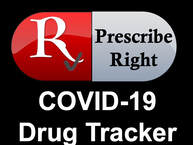|
COVID-19 Monoclonal Antibodies
BARDA has provided a $486 million Project Warp Speed grant to AstraZeneca to evaluate the long-acting monoclonal antibody combination, AZD7442, in two Phase III trials. A 5,000 patient trial will evaluate AZD7442 to prevent COVID-19 for up to 12 months and a 1,100 patient trial will evaluate the antibody as post-exposure prophylaxis. AstraZeneca will supply up to 100,000 doses by the end of 2020 and the US can acquire an additional one million doses in 2021 under a separate agreement. NIAID is comparing bamlanivimab plus remdesivir to remdesivir alone in the treatment of hospitalized patients with COVID-19 in the 10,000 patient, Phase III, ACTIV-3 trial (NCT04501978). The trial was initiated in August 2020, but temporarily paused in October 2020 on the recommendation of a data and safety monitoring board to allow time to review safety data. The FDA issued a violation notice to Lilly due to quality review issues, which would need to be fixed, to be in compliance with manufacturing standards for authorization of a drug. COVID-19 Vaccines Vaxart is developing the non-replicating adenovirus type-5 (Ad5) viral vector DNA virus, VXA-CoV2-1.
In a 195 patient, Phase I trial (NCT04368728), two vaccine candidates (BNT162b1 and BNT162b2) were tested in healthy adults. Patients that received BNT162b2 had a lower incidence and severity of systemic reactions than BNT162b1. No safety issues were identified, but most participants reported mild to moderate injection site pain. Tiredness, headaches and fever was reported after the second dose. Both vaccines elicited antibody levels one-month after a second dose of vaccine that were greater than levels seen in a group of recovered COVID-19 patients. COVID-19 Treatments Risankizumab (Skyrizi, Boehringer Ingelheim and AbbVie) is a monoclonal antibody approved for the treatment of severe plaque psoriasis.
The NIH provides guidelines for the treatment of patients with COVID-19 that are continuously updated. A list of updates and recommendations by date of publication are provided to help health care practitioners stay current. The guidelines include an Overview of Therapeutic Management of Patients with COVID-19, based on disease severity. There is also a review of evidence that supports or refutes the use of therapies and a recommendation by NIH for or against use of the therapies. Current treatment recommendations are organized by severity of disease in an easy-to-use graphic.
Comments are closed.
|
Stay informed, subscribe to the Prescribe Right Pharmaceutical Pipeline Tracker
Archives
January 2023
Categories |
Services |
Company |
Support |
© COPYRIGHT 2015. ALL RIGHTS RESERVED.
|


 RSS Feed
RSS Feed